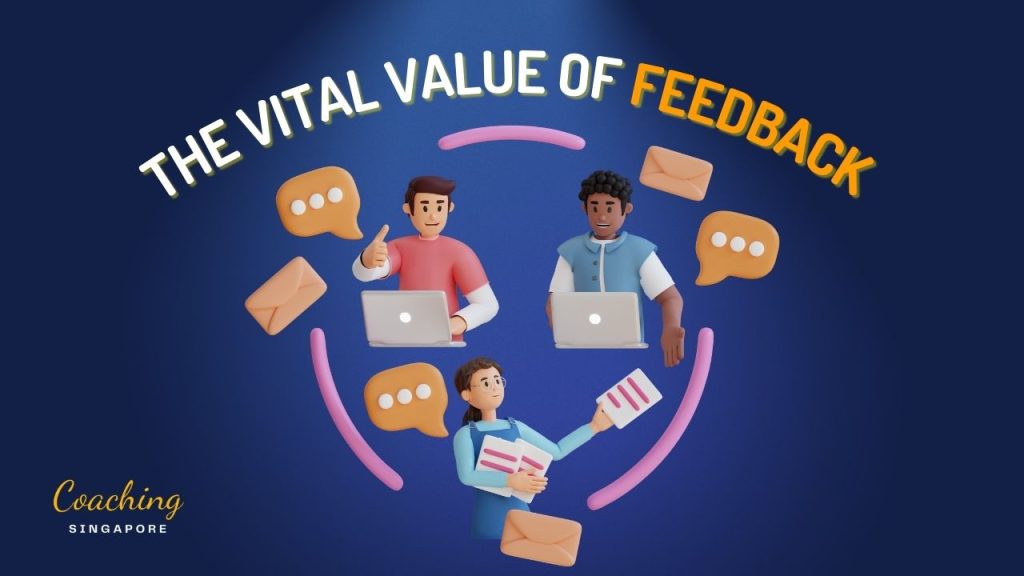Home » Financial Resilience » The Vital Value of Feedback: A Powerful Way to Improve Every Day and in Every Way
The Vital Value of Feedback: A Powerful Way to Improve Every Day and in Every Way

Learn continually – there’s always “one more thing” to learn! – Steve Jobs
The word “feedback” often evokes a reaction of fear, loathing, or repulsion in people – especially from working adults.
Feedback is subconsciously understood as a “memo” given out for “bad behaviour” exclusively.
Yet, in the journey of personal growth, professional development, and organisational success, feedback emerges as a powerful tool that can shape and refine our paths. Whether applied at the individual, team, or company level, the right kind of feedback can steer us toward continuous improvement. It’s not just about receiving information, but about channelling it into actionable insights that drive progress. In this article, we will delve into the seven best approaches to gain good feedback, emphasising its significance across all levels of engagement.
Why the Right Kind of Feedback?
Feedback is more than just a commentary; it is a mirror reflecting our strengths, weaknesses, and opportunities for growth. In a rapidly evolving world, where the pace of change has become the new constant, feedback acts as a compass, guiding us to learn the right lessons and unlearn incorrect ideas, habits, and practices. It acts as a catalyst for innovation, providing an external perspective that enriches our understanding and drives our efforts to evolve.
The Essentiality of Feedback for Executives
Executives, who lead the helm of organisations, must epitomise continuous growth. The ability to adapt and evolve quickly in response to market dynamics, technological advancements, and societal shifts is paramount. Feedback serves as an accelerant for executive growth, enabling them to identify blind spots, capitalise on strengths, and make informed decisions. It’s not about resting on laurels but about cultivating a mindset of perpetual learning and improvement.
Constructive Feedback vs. Negative Criticism
Not all feedback is created equal. Constructive feedback focuses on highlighting areas of improvement while offering actionable suggestions for enhancement. It provides a balanced perspective, acknowledging strengths alongside weaknesses. Negative criticism, on the other hand, is devoid of insights and contributes little to personal or professional development. Recognizing the distinction is vital to extracting value from feedback and preventing it from becoming demotivating or counterproductive.
The Seven Best Approaches to Gain Good Feedback
Solicit Diverse Perspectives: Seek feedback from a range of sources – peers, mentors, subordinates, and even customers. Each perspective offers a unique angle, contributing to a comprehensive understanding of your performance.
Create a Safe Environment: Foster an atmosphere where open and honest feedback is encouraged. When individuals feel safe sharing their opinions, they are more likely to provide valuable insights.
Set Clear Expectations: When requesting feedback, be explicit about what areas you are seeking input on. This helps reviewers provide focused and relevant comments.
Regular Check-Ins: Feedback shouldn’t be confined to annual reviews. Regular check-ins with peers, managers, or mentors can provide timely insights and allow for course corrections as needed.
Anonymous Feedback: Anonymity can promote candid feedback, particularly when addressing sensitive topics. This can be facilitated through surveys or feedback platforms.
Feedback Training: Provide training to individuals on how to give and receive feedback effectively. This cultivates a culture where feedback is seen as a growth opportunity rather than criticism.
Feedback Loops: Apply feedback loops to track progress. After receiving feedback and implementing changes, revisit the same sources to gauge improvement and refine further.
The Qualifiers of Effective Feedback Givers
Not everyone is qualified to provide valuable feedback. Effective feedback givers possess empathy, objectivity, and a keen understanding of the context in which feedback is given. It is not about tearing down but about building up. Constructive criticism should be underpinned by the intention to help the recipient progress, learn, and excel.
The Role of an Experienced Coach in Delivering Useful Feedback
Coaches play a critical role in providing feedback in various contexts, such as sports, professional development, personal growth, and more. Effective feedback helps individuals improve their skills, performance, and overall development. Here are some key aspects of the role of coaches in providing feedback:
Objective Assessment:
Coaches provide an objective assessment of an individual’s performance. They observe, analyse, and evaluate the person’s actions, techniques, strategies, or behaviours. This assessment is based on their expertise and understanding of the relevant domain.
Identifying Strengths and Areas for Improvement:
Coaches identify both strengths and areas for improvement in an individual’s performance. They highlight what the individual is doing well and acknowledge their accomplishments, which helps boost confidence. At the same time, they identify areas that require further development to achieve better results.
Specificity:
Effective feedback from coaches is specific and detailed. Rather than offering vague comments, coaches provide concrete examples and actionable suggestions. Specific feedback helps individuals understand what exactly they need to work on or adjust.
Constructive Criticism:
Coaches deliver criticism in a constructive manner. They focus on behaviours and actions, rather than personal traits or characteristics. This approach reduces defensiveness and encourages individuals to see the feedback as an opportunity for growth.
Setting Goals:
Coaches work with individuals to set realistic and achievable goals. Feedback is often tied to these goals, helping individuals track their progress and stay motivated. Goals provide a clear direction for improvement.
Individualised Approach:
Coaches recognize that each individual is unique and has different strengths, weaknesses, and learning styles. They tailor their feedback to match the individual’s needs and preferences, ensuring that the feedback is relevant and effective.
Timeliness:
Providing feedback in a timely manner is crucial. The sooner individuals receive feedback after a performance, the more relevant and impactful it is. This allows for prompt adjustments and prevents the reinforcement of incorrect behaviours.
Two-Way Communication:
Effective coaching feedback involves a two-way dialogue. Coaches listen to the individual’s perspective, concerns, and questions. This creates a collaborative environment where both parties work together to enhance performance.
Positive Reinforcement:
In addition to areas for improvement, coaches also emphasise positive aspects of an individual’s performance. Positive reinforcement boosts motivation and morale, helping individuals maintain a growth mindset.
Monitoring Progress:
Coaches continuously monitor the progress of individuals and track their development over time. This involves providing ongoing feedback and making adjustments to the coaching approach as needed.
Encouraging Self-Reflection:
Coaches encourage individuals to reflect on their own performance. This helps individuals develop self-awareness and take ownership of their growth by identifying areas for improvement on their own.
Creating a Safe Environment:
Coaches create a safe and supportive environment where individuals feel comfortable receiving feedback. This encourages open communication and a willingness to embrace change and learning.
As we see, coaches play a pivotal role in providing feedback that supports an individual’s growth and development. Their ability to deliver timely, specific, and constructive feedback, while considering individual differences, helps individuals achieve their goals and reach their fullest potential.
This strategy can ultimately improve your resilience i.e. bouncebackability in key areas of your life over time.
In conclusion, the power and importance of feedback cannot be overstated. It is a compass that guides us toward continuous improvement, offering insights that challenge our perspectives and lead us to better versions of ourselves. From individuals striving for personal growth to teams aiming for collaborative success, and from executives navigating the corporate landscape to entire companies charting their course, feedback is the common thread that binds them all in the pursuit of excellence. Embrace the right kind of feedback, and you’re poised to improve every day and in every way.
Comment: Is there any tip/hack that you have personally used in order to learn things quickly which has not been covered in this blog?
Let me know in the comment section below, I would love to hear your stories.
Share This Post, Choose Your Platform!
Categories
- Mental Resilience
- Emotional Resilience
- Financial Resilience
- Interpersonal Resilience
- Physical Resilience
